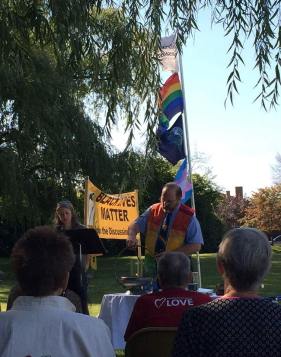
At the UU Congregation at Shelter Rock pulpit
My call to ministry began through work with Unitarian Universalist youth. The guiding principle of empowerment, fundamental to our ministry to and with youth, lies at the core of my ministerial philosophy. I provided information necessary for youth to make decisions about their lives and their world, and then nurtured a learning environment in which they were free to explore, to take on responsibilities, to succeed, and even sometimes to fail. I helped create a safe and loving space for the youth to live religious lives every day.
My philosophy of worship and preaching also benefited from years of experience helping youth design their own worship services. Worship at youth conferences and camps differs fundamentally from typical church experiences. As practiced by youth, this “round” worship style generally takes place:
- late at night, in the dark or with modest candle light;
- in relative silence, with music generally provided only by human voices;
- within an open space with most participants seated or lying on the floor;
- with no set time limits or expectations – in my experience, I have seen youth services that lasted 15 minutes and others that lasted several hours;
- following a general structure, but with service elements varying greatly from one service to another;
- with youth leadership, by a group who have planned the worship entirely that day in the context of the day’s events; and most important
- with a deep level of spiritual, emotional, and even physical intimacy.
Transitioning to the more traditional “square” Sunday morning worship services (named this because of the normal placement of seats/pews relative to service leaders), I bring some of these round elements with me, particularly the last piece. I employ in worship services activities and a tone that encourages more intimate interactions among congregants during the service. I believe that affinity, even communion of souls, lies potential for powerful interactions between people and for personal transformation.

Dedicating our Black Lives Matter banner
My sermonic style typically includes a story or personal reflection as a lead-in or bridge to connect with congregants. I avoid “book report” sermons, believing that congregants can read just as well as I, and may often know just as much or more as I do about a given topic. My gift, honed over years, is an ability to make connections between disparate ideas or experiences. My sermons tend to be multi-layered, sometimes bordering on the complex, as I draw these connections together into a common narrative.
My theology of worship and preaching derives in part from my personal theology. So, while I believe that notions of divinity and sacredness require newer and more modern definitions, my theology does include a quantum cosmological view, aware of the unexplainable and of the mysterious in our lives. I favor Csikszentmihalyi’s definition of flow as a “transcendental” or “religious” state in which events follow one another in a unified, organic fashion without our conscious interference. In a state of flow, consciousness and behavior seem as one. In a worship service, deep flow may be further characterized by:
- timelessness;
- integration of mind and body;
- a true and welcomed dependency on others;
- a sense of our place in the universe;
- a dimension of depth, encountering ultimate concerns; and
- merging of action and awareness.
So, like my experience with youth worship over the years, I strive to harness these energies within the framework of a worship service, to foment interaffective responses and to create the potential for intense, even ecstatic moments.
I do not believe in a Holy Spirit in the Christian sense of the term, but I do believe in spirit, perhaps certain elemental energies, that can move between us and even guide us toward recognizing unique synchronicities. I believe that spirit is an interaffective force of human essence, which travels between us perhaps on invisible spiritual fields. And, I believe that a minister, by tapping into those fields, can learn to sense, perhaps even enhance and direct that force. For me, worship and preaching require a seamless melding of intellect, emotion, and body.

Preaching at Regional Assembly
My historical grounding in our Unitarian Universalist movement lies in each heresy, each choice my ancestors made to break away from the traditional belief paradigms of the Abrahamic religions. I am grounded by the countless Unitarians and Universalists who dared to think that society could change in fundamental ways to improve the condition of people’s lives and the ability of people to achieve their highest purpose in life. I am particularly grounded in the enormous sacrifices of Servetus, the Polish Brethren, and others burned, imprisoned, tortured, and exiled for supporting the freedom to believe and to worship in the manner they chose.
I am grounded in the work of skeptics and freethinkers; of scholars who challenged the traditional interpretation of the Bible as a self-evident historical document; of scientists who continue to probe the nature of human consciousness and explain the unknown through rational means. I am grounded in the first and second Humanist Manifestos and in the writings of people who suggested that we can be religious people without god. I am grounded in ministers past, like Dietrich, Holmes, Davies, and Patton, who spoke with prophetic voices about creating a universal religion from Unitarian Universalism. I am grounded in modern-day thinkers, who suggest that some traditional belief systems – with their restrictions on thought and encouragement of hostility – have corrupted religion and spawned global violence.